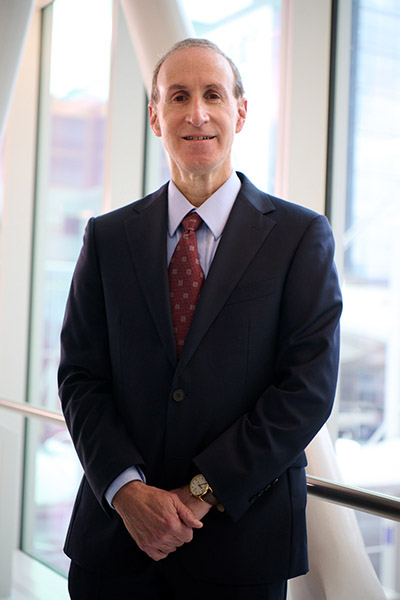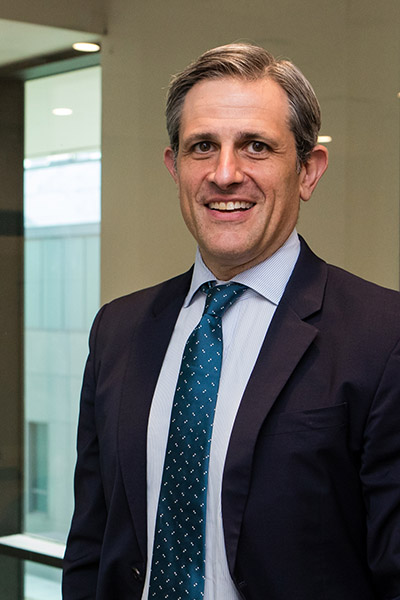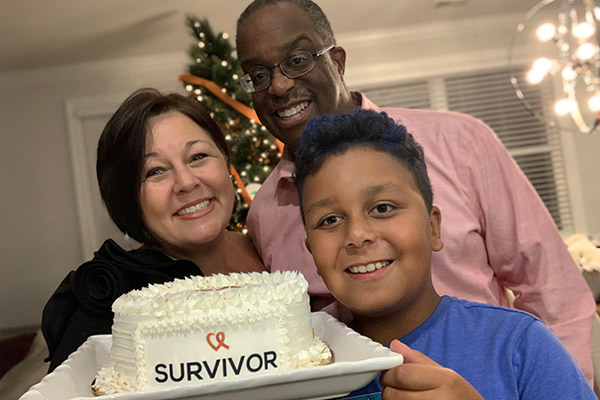Becoming Her Own Hero
Surviving two types of cancer taught Loriana to be her own advocate

Georgia-born Loriana Hernandez-Aldama was living in Texas, enjoying a successful career as a TV news anchor, when she says two doctors in Austin dismissed her fatigue. They told her she was just tired and overworked, “a new mom trying to have it all.” Loriana was in the midst of a fertility treatment aimed at having another baby. In fact, it was her fertility doctor who told her, “You have acute myelogenous leukemia.”
“You have to find joy as a cancer survivor and patient in the straightaways because there’s always going to be little things that pop up in survivorship that alter your life.”
Loriana says this is how she learned to appreciate the difference between a community cancer center as compared with a National Cancer Institute-designated Comprehensive Cancer Center like Hopkins and Winship Cancer Institute of Emory University: “one of them saying, ‘you’re just tired’ and another one saying, ‘you’re dying.’”
That difference, and the seriousness of her diagnosis, led Loriana to make the hard choice to leave her son for what turned into a year in order “to be here today.”
Ten months into her treatment, chemo wasn’t working. Her doctors held off on trying to do a stem cell transplant because, as a Latina, Loriana confronted the fact that there are very few compatible donors because of a low number of Latinos and other people of color in the bone marrow donor registry and in clinical trials. Again, she was told, “We don’t know if you’re going to live.”
Loriana had little choice but to move forward with the stem cell transplant. Afterward, during the COVID-19 pandemic, Loriana also developed breast cancer—like her sister. In fact, cancer was all too familiar in her family: besides her sister, her mom had throat cancer, and her dad has a blood disorder.
Rebuilding the “pit crew” in a new city
Loriana and her husband’s television careers meant moves every couple of years. The challenge of building what she calls “a whole new pit crew” after each move added to the stress of living with cancer. “Having to build that team is intimidating, and you have to have trust,” she says. “For me, it was very scary to leave the doctors that saved my life.”

David A. Frank, MD, PhD
Three years later, Loriana says, “Once I got established here and built the whole team, I feel so good being here at Emory, and I feel that I’m safe and protected, and I’m in the best hands that I could ever be in.”
In particular, she says, “I have been blessed to find Dr. [David] Frank, one of the most patient-centric, amazing doctors who actually leans in, listens and looks at the whole patient—which is what we need all doctors to do, all oncologists. He knows how to talk to each patient in the way that they need to be spoken to and how they understand. And so, I do feel very safe having him as my fearless leader in my leukemia world.”
For his part, David A. Frank, MD, PhD, Winship’s director of the Division of Hematology and professor of hematology and medical oncology at Emory University School of Medicine, says, “I have spent a good part of my career, both at Harvard and at Emory, teaching medical students, interns, residents and fellows. I always tell them that whenever you are in a room with a patient, regardless of whatever else is happening in your life, the only thing you should be focused on is what this person is saying to you and what you can be doing to help them.”

Kevin Kalinsky, MD, MS
Her high regard for Kalinsky is mutual. “She is an incredible advocate for herself and her family,” he says of Loriana. “She comes to clinic prepared and asks thoughtful questions.” He points out that Loriana’s experience at Winship “highlights the benefits of being cared for at a comprehensive cancer center and the associated multidisciplinary care based on patient-oriented research.”
Surviving, but living with PTSD
Loriana calls the mental health aspects of her cancer experience “cancer’s invisible side effect.” After her treatment and transplant, she says she experienced “cancer-related PTSD.” Being separated from her son while undergoing treatment far from home, together with the risks and uncertainties of the transplant and being told multiple times that she might not live fused into a perfect storm for post-traumatic stress disorder.
Even after surviving cancer, challenges remain—including mental health. Loriana says, “If people start to see that there is a connection between my being mentally well and staying on treatment and in treatment, it’s a win-win for everybody. Compliance goes up. We go to our appointments when we feel better. When we’re depressed, we’re not going to come to our appointments. When we’re depressed, maybe anxiety goes up and more problems come together.”

Loriana with her husband and son
In her experience, Loriana has found that not every institution providing cancer care offers mental health care as part of its survivorship programming. At Winship, she says, “I am so blessed. I have a psychiatrist here named Dr. [Wendy] Baer, and she has really helped me navigate part of this journey, because the level of PTSD that I live with really controls my life in so many ways.”
Wendy Baer, MD, serves as Winship’s director of psychiatric oncology and is an associate professor, holding joint appointments in the Department of Psychiatry and Behavioral Sciences and the Department of Hematology and Medical Oncology at Emory University School of Medicine. Baer says, “We know that when somebody’s suffering from clinical depression or an anxiety disorder, or in their actions with regard to addiction and a substance use disorder, those medical problems interfere in people’s ability to take care of themselves and follow recommendations for best practices to manage cancer and treatment."
“Survivorship is tough,” says Loriana. “In survivorship, you’re constantly on your toes, looking over your shoulder, fearing a shoe’s going to drop.” She has to catch herself, pull herself back into the mindset of gratitude, so depression doesn’t take over.
One way Loriana keeps herself out of what she calls a “dark rabbit hole” is by using her voice to advocate on her own behalf and for others who aren’t as comfortable asking for explanations or taking an active role in their care. “I’m a former news anchor and network medical reporter,” she says. “If I can use my voice and share my depression and trauma, be transparent and vulnerable, and help another life, then I feel like I have a moral obligation to do it, because I said, ‘If I live, I will serve.’ I’ve just been serving ever since. It feels like it’s all I can do to deal with the depression.”
Loriana hates the phrase “the new normal” in survivorship. “But I’ve had to shift what brought me joy.” She is working on a book she is calling “Finding Joy Between the Fence Posts.” “You have to find joy as a cancer survivor and patient in the straightaways because there’s always going to be little things that pop up in survivorship that alter your life.”
Summing up the ways she is managing the aftereffects of having had cancer, Loriana says she stays very active, works out and tries to be her own hero. She says, “I know that the more fit you are going into a fight, whatever it may be, the better positioned you are to prevail and do well.”




